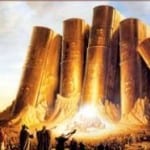Together with Shema
In the parashah of Balak, we find prophetic verses of exquisite beauty, and an inspiring story of God’s protection over the Jewish people. But to truly appreciate this Torah portion, one should ponder a remarkable teaching of the Sages.
The Talmud (Berachot 12b) relates that the rabbis contemplated incorporating this reading into the daily prayers, alongside the recitation of the Shema. This is truly an astounding statement. What lesson is contained in the words of Balaam — a villainous prophet, steeped in senseless hatred for the Jewish people — that could possibly compare to the Torah’s most fundamental beliefs, as affirmed in the Shema, the centerpiece of Jewish prayers?
Fortunately, the Talmud clues us in to what makes this parashah so significant. Its unique message, we are told, may be found in the following verse, comparing the Jewish people to a fearsome lion:
“[Israel] crouches, he lies like a lion and like a lioness — who dares rouse him?” (Num. 24:9)
Yes, it’s a beautiful metaphor describing the strength and endurance of the Jewish people. But does this verse justify reading the entire portion of Balak twice a day, together with the Shema?
The Third Axiom
Clearly, the Sages saw an inner link between Balak and Shema. In order to understand this connection, we must first analyze the principle themes of Shema. The Sages taught (Berachot 13a) that the first passage of Shema expresses God’s unity and overall acceptance of God’s rule; the message of the second passage is acceptance of the mitzvot.
However, these two axioms of Judaism — God’s unity and accepting the mitzvot — are missing a common link. What is the entity that combines them, that enables the performance of mitzvot to ultimately lead to universal acceptance of God? The missing link is the Jewish people.
The aspirations expressed in Shema require a people who, throughout the generations, will fulfill the mitzvot and thereby reveal God’s unity to the world. This is the mission of the Jewish people. In fact, they were created specifically for this purpose, as it says, “This people I created for Me, [so that] they will tell My praise” (Isaiah 43:21).
Now we can understand why the Sages desired to add this particular verse to the recital of Shema. Balaam’s metaphor compares the Jewish people to a sleeping lion that none dare disturb. All fear the formidable powers of this majestic creature, even in his sleep. The latent power of the Jewish people is such that, even when sleeping — even when they are banished from their land and dispersed amongst the nations — their eternal nature is legendary.
The endurance of the Jewish people throughout the generations, despite all odds and in violation of all laws of history, enables them to persist in their sacred mission of proclaiming God’s unity. Their indestructible nature is in itself a sanctification of God’s Name.
Jewish Nationalism
If the significance of the parashah of Balak can be reduced to this single verse, then why not just add that verse to the daily prayers?
The Talmud explains that we may not add the verse by itself, since the Torah should not be arbitrarily broken up. “Any section that Moses did not divide off, we may not divide.”
This explanation requires further examination. We find many individual verses incorporated in the liturgy. Why not this one?
Apparently, detaching this particular verse from the rest of Balaam’s prophecy poses a special danger. By itself, the verse could be construed as extolling nationalism for its own sake. The unique strength of the Jewish people is not for self-centered nationalism, for military conquests and national aggrandizement. The eternal nature of Israel must be understood within the context of their special mission, to promulgate God’s Name in the world. Therefore we should take care not to separate this verse from the rest of the portion.
Appreciating the Message of Balak
In the end, the Sages did not add the parashah of Balak to the daily prayers. They felt that such a lengthy addition would be too great a burden for the people.
Reading this portion would be a burden, since its message is not suitable for all times. Not every generation is capable of appreciating the role played by Israel’s national strength in achieving our spiritual goals. Yet the very fact that the Sages wanted to add it indicates that a time will come when this message will be accepted and internalized by the nation as a whole.
(adapted from Ein Eyah vol. I, pp. 67-68)

